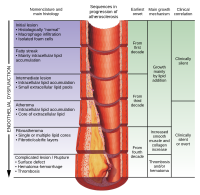
Photo from wikipedia
Fibroblast growth factor (FGF) 23 is a bone-derived hormone regulating serum inorganic phosphate (Pi) concentration. FGF23 is also involved in the development of chronic kidney disease (CKD)-mineral and bone disorder.… Click to show full abstract
Fibroblast growth factor (FGF) 23 is a bone-derived hormone regulating serum inorganic phosphate (Pi) concentration. FGF23 is also involved in the development of chronic kidney disease (CKD)-mineral and bone disorder. Serum FGF23 concentration begins to increase early in the progression of CKD and can be remarkably high in hemodialysis patients with end-stage renal disease. It has been reported that high FGF23 concentration is a risk factor for cardiac dysfunction, atherosclerosis, infection or systemic inflammation in CKD patients. FGF23 was also shown to induce cardiac hypertrophy directly acting on cardiomyocytes. However, it is still controversial whether high FGF23 is causing cardiac dysfunction, atherosclerosis, infection or systemic inflammation in CKD patients. In the current study, we investigated whether FGF23 concentration is associated with cardiac dysfunction, atherosclerosis, infection or systemic inflammation in Japanese hemodialysis patients. We recruited 119 hemodialysis patients and examined the association between serum FGF23 concentration and several parameters concerning mineral metabolism, cardiac dysfunction, atherosclerosis, infection, and systemic inflammation. Serum FGF23 concentration was independently associated with serum calcium and Pi concentration ( β = 0.276, p < 0.001; β = 0.689, p < 0.001). However, serum FGF23 concentration was not associated with parameters of cardiac dysfunction, atherosclerosis, infection, and systemic inflammation, either. Our results do not support the hypothesis that high FGF23 in dialysis patients is the cause of cardiac dysfunction, atherosclerosis, infection or systemic inflammation.
Journal Title: Journal of Bone and Mineral Metabolism
Year Published: 2019
Link to full text (if available)
Share on Social Media: Sign Up to like & get
recommendations!